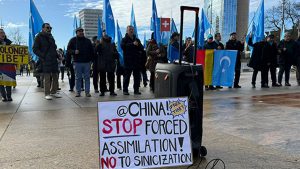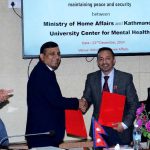
UN Chief urges Sudan Generals to stop fighting immediately

U.N. Secretary-General Antonio Guterres appealed Tuesday for the fighting between rival generals in Sudan to “stop immediately” and warned that it must not turn into a prolonged, full-scale war.
“This conflict will not and must not be resolved on the battlefield — with the bodies of Sudan’s people,” he told an evening meeting of the Security Council to discuss the situation.
He said the parties must respect the U.S.-brokered, 72-hour cease-fire that started at midnight Monday.
Both the Sudanese Armed Forces of General Abdel Fattah Burhan and the paramilitary Rapid Support Forces led by General Mohamed Hamdan Daglo publicly pledged to uphold the halt in fighting.
The U.N.’s top diplomat in Sudan, Volker Perthes, told the council via a video briefing from the city of Port Sudan, where he and hundreds of U.N. staff have relocated from Khartoum, that the temporary cease-fire was holding only in some parts of the country, and that the army and RSF were each accusing the other of truce violations.
“However, we also hear continuing reports of fighting and movement of troops,” he told the council.
“In Khartoum, fighting around the Republican Palace, Khartoum international airport, the army headquarters, RSF bases and other strategic locations has largely continued or, in some cases, intensified,” Perthes said. “Airstrikes and heavy shelling have also continued, particularly in Bahri and Omdurman.”
Some tribes mobilizing
Omdurman, north of the capital, is the largest city in Sudan, with more than 2.3 million residents.
The U.N. envoy said the situation in Darfur “remains volatile,” with fighting in the south and west. He expressed concern about reports that tribes are arming themselves in West Darfur to join the fight.
“Reports of mobilization by some tribes and some armed movements in Darfur who are taking sides is dangerous and could draw in Sudan’s neighboring countries,” Perthes warned.
Since fighting began on April 15, he said at least 427 people have been killed and up to 4,000 wounded, and the numbers are growing. Five aid workers are among the dead, as well as an Egyptian diplomat. Perthes called on the parties to allow civilians to safely leave conflict areas.
The U.N. envoy has been in regular contact with the rival generals.
“There is as yet no unequivocal sign that either is ready to seriously negotiate, suggesting that both think that securing a military victory over the other is possible,” Perthes said. “This is a miscalculation.”
Evacuations
The United Nations says it is not leaving Sudan, but it has temporarily relocated about 1,200 people from Khartoum to Port Sudan. Perthes said that includes 744 U.N. staff and their dependents, international NGO personnel and diplomatic staff from embassies.
“Today, this afternoon, I said farewell to 450 of them, when they boarded a French frigate that will take them to Jeddah through the night,” Perthes said. “The rest will be evacuated with commercial vessels over the next two days. A few international staff and their dependents are still in Khartoum and were not evacuated due to various reasons.”
Conflict deepens Sudan’s needs
Before fighting erupted 10 days ago, more than 15 million Sudanese needed humanitarian assistance.
“This conflict will not only deepen those needs, it also threatens to unleash an entirely new wave of humanitarian challenges,” U.N. deputy humanitarian chief Joyce Msuya told council members. “Fighting is massively impeding and imperiling aid operations. A humanitarian crisis is quickly turning into a catastrophe.”
Countries have rushed to evacuate their diplomats and citizens. In all, more than 4,000 people have fled Sudan in foreign-organized evacuations that began on Saturday, including by sea to Saudi Arabia and by aircraft to Jordan and Cyprus.
Canada, Egypt, France, Germany, Italy, Sweden, Ukraine and the United States are among the countries using aircraft and convoys to ferry foreign nationals out of the country.
The majority of U.S. government personnel who evacuated the Sudanese capital, Khartoum, arrived Monday afternoon in Washington.
Britain’s foreign office said it began an evacuation effort Tuesday with flights leaving from an airfield outside of Khartoum.
China’s foreign ministry said Tuesday that most of its nationals had been safely evacuated.
Sudanese nationals fending for selves
Sudanese nationals are fending for themselves amid power blackouts and loss of internet service.
Some Sudanese have made the decision to escape in cars and buses on dangerous roads. The U.N. refugee agency said at least 20,000 Sudanese have arrived in Chad since fighting started and it has registered 4,000 South Sudanese refugees who have crossed back into their country from Sudan.
“We have received reports of tens of thousands of people arriving in the Central African Republic, Chad, Egypt, Ethiopia, and South Sudan,” the deputy humanitarian chief said, adding it is critical to keep borders open.












Comments